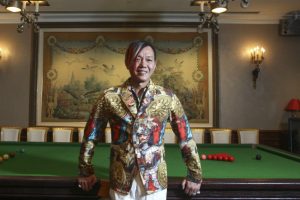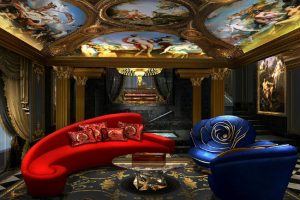 The ultra-luxurious casino hotel in Macau, dubbed The 13, will not launch before March 2019, a recent financial filing of its developing company reveals. The top-tier property was intended as a first-class resort targeting VIPs and high-rollers but an avalanche of setbacks have postponed its opening multiple times, with a new date set for March 2019.
The ultra-luxurious casino hotel in Macau, dubbed The 13, will not launch before March 2019, a recent financial filing of its developing company reveals. The top-tier property was intended as a first-class resort targeting VIPs and high-rollers but an avalanche of setbacks have postponed its opening multiple times, with a new date set for March 2019.
At the lavish cost of $1.6 billion, the casino resort was announced in 2013 and by 2017, it was built away from the Cotai Strip, the bustling strip of busy casinos and hotels that made Macau the world’s biggest casino market. Instead, the property is located on the Coloane Island, a calm, undeveloped and mostly residential area of Macau. Its developer The 13 Holdings Ltd., however, has faced many obstacles, including serious financial setbacks that pushed the struggling project into uncertainty.
In its financial filings to the Hong Kong Stock Exchange on Sunday the company said it now plans the launch of the casino and the retail operations in its resort for a date no earlier than March 31, 2019, a year later than what was originally expected. It also announced it needs to raise additional capital through new rights issue – $124.4 million will be needed for the finishing the hotel, while the casino’s development and equipment costs will be around $45 million. The latter will be covered by capital raised sometime in the future.
The casino resort, bearing the unlucky name The 13, was initially called Louis XIII after the king of France, who today symbolizes the French monarchy at its peak. It was intended as an ultra-luxurious destination that would attract the Chinese business elite and affluent high-rollers from all over the world. The person behind this idea was the extravagant Chinese property investor and entrepreneur Stephen Hung, the chairman of The Taipan Investment Group and the vice-chairman of Rio Entertainment Group, which operates the Rio Hotel & Casino in Macau.
Decadent Casino Resort Amidst Macau’s VIP Market Decline
 The project gained much publicity because of the flamboyant investor who, without an operating hotel or even a casino license, purchased a $20 million fleet of 30 Rolls-Royce Phantoms that would transport his VIP guests to and from the resort. He also sent part of the hotel’s employees in Paris for training, even though there was no single reservation made. Moreover, the Gaming Inspection and Coordination Bureau in Macau said back in November that the company still had not filed an application for a casino license.
The project gained much publicity because of the flamboyant investor who, without an operating hotel or even a casino license, purchased a $20 million fleet of 30 Rolls-Royce Phantoms that would transport his VIP guests to and from the resort. He also sent part of the hotel’s employees in Paris for training, even though there was no single reservation made. Moreover, the Gaming Inspection and Coordination Bureau in Macau said back in November that the company still had not filed an application for a casino license.
The development of The 13 started just when China began cracking down on corruption and money laundering, often linked to casinos and businesses based in Macau. Back in 2014, the Chinese president Xi Jinping criticized the excess of projects of this kind. The two-year retreat in the VIP market caused the abandonment of various projects across Macau while the planned casino resort saw development delays and financial setbacks among its many obstacles. In July 2017, a liquidity crunch stopped the development work, and in October, the shares of the company lost half their value. In fact, shares dropped 80 per cent from 2014 to merely $0.06.
Last month, Stephen Hung stepped down as a joint chairman and executive director of The 13 Holdings, announcing he would no longer sit on company committees. Meanwhile, the company he founded announced this week that it has reached an agreement with one of the six casino operators that are currently fully licensed in Macau. Although the name of the casino concessionaire’s affiliate was not announced, it is expected to operate the casino facility at The 13 with its own license.
The developer says the hotel will open by April 30, 2018, while the casino and retail operations will not be available for another year. Should the casino open, it will feature 50 slot machines and 66 gaming tables, 16 of which will be exclusive VIP tables for high-rollers. The other 50 tables will target the so-called “high stakes mass market”, the company explains.



















